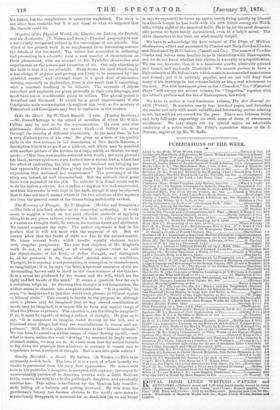The Economy of Thought. By T. Hughes. (Hodder and Stoughton.)
—Tho title of this book strikes us as somewhat misleading. It would seem to suggest a work on the most effective methods of applying thought to any given subject, whereas the book is rather meant to be a treatise on thought itself, its nature, its various forms and attributes. We cannot commend the style. The author expresses a fear in his preface that it will not meet with the approval of all. But we cannot allow that the faults of style are due to the subject-matter. We know several books which handle equally abstruse topics with singular perspicuity. Tho two first chapters of Mr. Hughes's work do not, to our mind, at all clearly explain what he calls the object-matter of his book, or define thought, and distinguish it, as he professes to do, from other mental states or conditions. Thought, he is arguing, is not perception, or conception, or remembrance, or imagination ; it is, he says, "in brief, a spiritual utterance of the un- derstanding, known only in itself to the consciousness of the thinker. It is a secret act produced by the reason and the will, which are the right and left hands of the mind." It seems a question bow far such a definition helps us. In showing that thought is not imagination, the author seems to stumble into complete confusion. "It is possible," he says, "to imagine and to put into words such phrases as bilineal square or bilineal circle." This remark is hardly to the purpose, as, although such a phrase may be imagined just as any absurd combination of words may be imagined, it is impossible to form any mental image of what the phrase expresses. The question is, can the thing be imagined ? If so, it must be capable of being a subject of thought. He goes on to say, "It is competent to imagine water flowing up the hill, and a thousand other things, but they are contradictions to reason and ex- perience." Still, this is quite a different case to the " bilineal triangle." We can form to ourselves a clear image of water flowing up-hill,—and what is more unless the word " flowing " be assumed to imply uncon- strained motion, we may see it. It would seem that the author intends to lay down the principle that whatever is contrary to reason and to experience is not a subjeot of thought. But is not this quite untrue ?


































 Previous page
Previous page